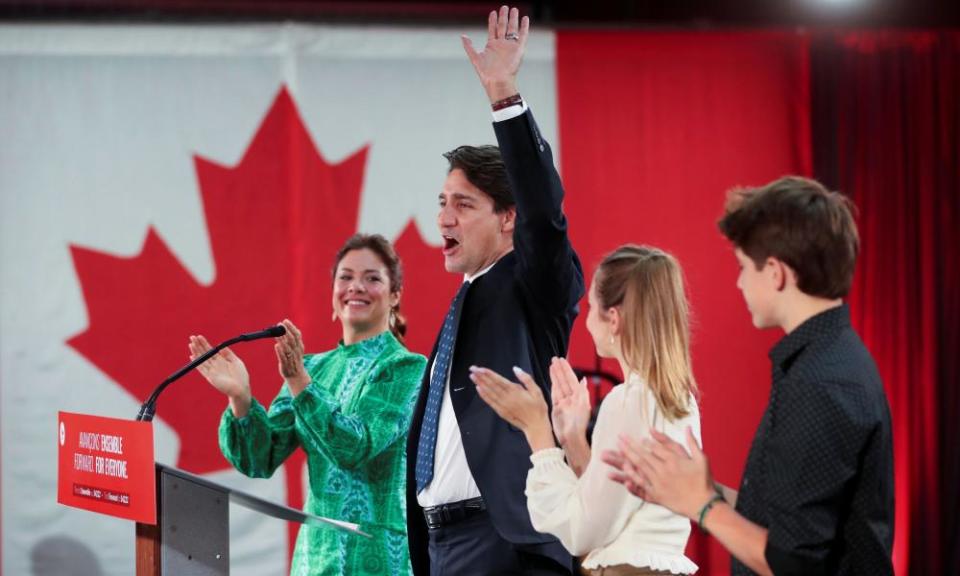Trudeau didn’t win the majority but still has chance to pass sweeping legislation

Justin Trudeau went into Monday’s federal election with one of the world’s highest Covid-19 vaccination rates, billions spent on pandemic aid and the hope that he could convert the earned goodwill into a majority government.
He fell short of that aim: after a 36-day campaign and a C$610m election, the makeup of parliament remained largely unchanged, with the Liberals holding roughly 158 seats – short of the 170 needed for a majority.
Related: Justin Trudeau secures a third victory in an election ‘nobody wanted’
The Liberals received a smaller share of the popular vote than any other winning party in the country’s history – suggesting the prime minister’s popularity is waning, despite his party’s electoral advantages. And while the math in parliament remained largely the same, three of Trudeau’s cabinet ministers didn’t win re-election.
Trudeau will be forced to navigate a parliament that he needs to woo in order to survive. But it may yet give him the rare opportunity to pass sweeping, legacy-defining legislation.
When he called the election in mid August, Trudeau was asked about his future as party leader if the Liberals once again fell short of majority government. Trudeau declined to answer, but said that more work was required on crucial issues such as child-care and housing, adding that he is “nowhere near done yet”.
Making his victory speech early on Tuesday, Trudeau showed no sign that he intends to step down, telling supporters that Liberals had won a “clear mandate” from the public to pursue sweeping policy initiatives.
“I think retiring from politics would be the furthest thing from Justin Trudeau’s mind right now … it’s a four-year mandate unless the government is bought down,” Gerry Butts, Trudeau’s longtime friend and former adviser told CBC News.
Despite falling short of his goal, Trudeau is unlikely to experience as severe a backlash from his own party as that facing the Conservative leader.
Erin O’Toole ran a centrist campaign, hoping to pick off disaffected Liberal voters who might otherwise be put off by a socially conservative leader.
But the gambit failed, and the party made no electoral gains, prompting questions about how long O’Toole can stay in power.
Still, Trudeau – who ran in 2015 as a progressive candidate with promises to upend the status quo – must increasingly contend with the reality of politics: as the incumbent, he bears the weight of his government’s successes – and failures.
“Even if this election hadn’t happened, he’s been prime minister for six years – and there’s only so long you can be in power before voter fatigue sets in,” said Lori Turnbull, a professor of political science at Dalhousie University.
The Liberals pledged big spending initiatives, including affordable, $C10 per day child care across the country – a plan the Conservatives had said they would scrap if elected. And Trudeau’s climate plans have won plaudits from economists and were called “bold and thoughtful” by a former top Green party leader.
While the parliamentary math remains largely unchanged, Trudeau has the opportunity to pass key legislation with the help of Jagmeet Singh and his left-wing New Democrats, who hold the balance of power.
The NDP spent millions on the campaign and has little appetite to head back to the polls, suggesting Trudeau has a cushion of votes to keep him in power for the coming years.
“If he’s willing to work with Singh, he can be prime minister who delivers a national childcare program, and be the one who delivers a real plan in place on climate change – something that has the support of multiple parties,” said Turnbull.
“If he wants it, there’s a real opportunity here for Trudeau. It’s a chance for him to cement a legacy.”

 Yahoo News
Yahoo News 